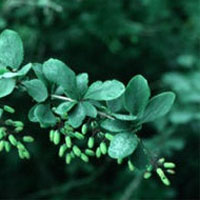health guides
Barberry
 © Steven Foster
© Steven FosterParts Used & Where Grown
The root and stem bark contain the medicinally active components of barberry. The barberry bush also produces small red berries. Although this particular species is native to Europe, it now also grows throughout North America. A closely related species, Oregon grape (Berberis aquifolium), is native to North America.
- Reliable and relatively consistent scientific data showing a substantial health benefit.
- Contradictory, insufficient, or preliminary studies suggesting a health benefit or minimal health benefit.
- For an herb, supported by traditional use but minimal or no scientific evidence. For a supplement, little scientific support.
Our proprietary “Star-Rating” system was developed to help you easily understand the amount of scientific support behind each supplement in relation to a specific health condition. While there is no way to predict whether a vitamin, mineral, or herb will successfully treat or prevent associated health conditions, our unique ratings tell you how well these supplements are understood by the medical community, and whether studies have found them to be effective for other people.
For over a decade, our team has combed through thousands of research articles published in reputable journals. To help you make educated decisions, and to better understand controversial or confusing supplements, our medical experts have digested the science into these three easy-to-follow ratings. We hope this provides you with a helpful resource to make informed decisions towards your health and well-being.
This supplement has been used in connection with the following health conditions:
| Used for | Amount | Why |
|---|---|---|
Chronic Candidiasis | Refer to label instructions | Barberry contains berberine, an alkaloid with antibiotic activity that also been shown to help relieve the diarrhoea seen in some people with chronic candidiasis. |
Diarrhoea | Refer to label instructions | Berberine, a constituent of barbarry, has been shown to improve infectious diarrhoea in some double-blind trials. |
Indigestion, Heartburn, and Low Stomach Acidity | Refer to label instructions | Taking barberry may help stimulate digestion and relieve an upset stomach. |
Infection | Refer to label instructions | Barberry is both immune supportive and anti-microbial. |
Parasites | Refer to label instructions | Berberine is derived from a few plants, including barberry. Studies have shown that berberine kills amoebae and can be used successfully to treat giardia infections. |
Psoriasis | Refer to label instructions | An ointment containing barberry may reduce inflammation and be effective against moderate psoriasis. |
Vaginitis | Refer to label instructions | Barberry is anti-bacterial and may be effective against infectious vaginitis. |
Traditional Use (May Not Be Supported by Scientific Studies)
Traditionally, in European and American herbalism, barberry was used to treat a large number of conditions, particularly infections and stomach problems.1 It has also been used internally to treat skin conditions.
Copyright © 2024 TraceGains, Inc. All rights reserved.
Learn more about TraceGains, the company.
The information presented by TraceGains is for informational purposes only. It is based on scientific studies (human, animal, or in vitro), clinical experience, or traditional usage as cited in each article. The results reported may not necessarily occur in all individuals. Self-treatment is not recommended for life-threatening conditions that require medical treatment under a doctor's care. For many of the conditions discussed, treatment with prescription or over the counter medication is also available. Consult your doctor, practitioner, and/or pharmacist for any health problem and before using any supplements or before making any changes in prescribed medications. Information expires December 2024.


 We are proud to announce that
We are proud to announce that  As the market evolves, customers increasingly request a wider variety of omega-3 options for their lipid...
As the market evolves, customers increasingly request a wider variety of omega-3 options for their lipid...  Maintaining healthy glucose levels is crucial for preventing metabolic conditions like diabetes,...
Maintaining healthy glucose levels is crucial for preventing metabolic conditions like diabetes,...  Looking at formulating a new vitamin blend? Discover
Looking at formulating a new vitamin blend? Discover 







































